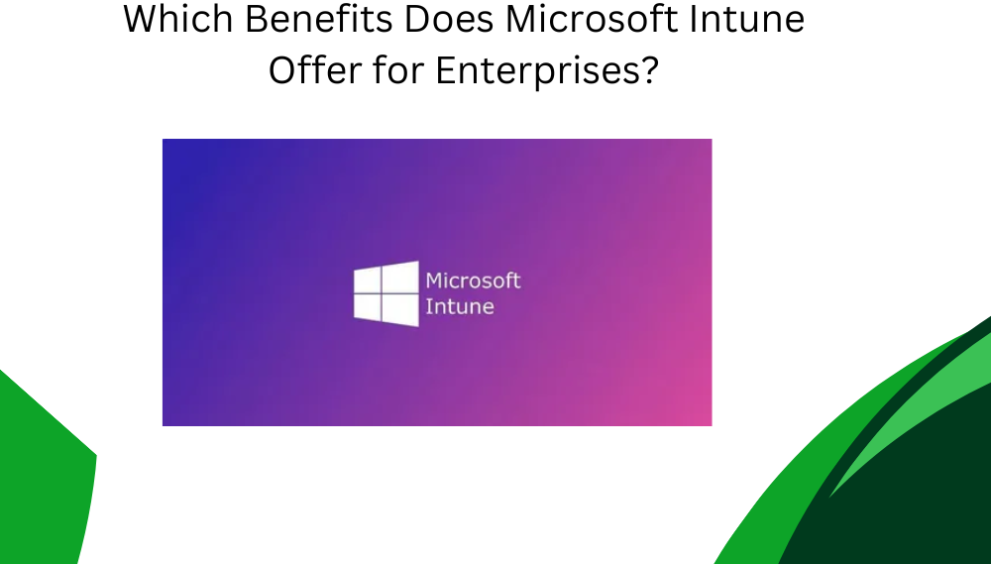Which Benefits Does Microsoft Intune Offer for Enterprises?

Microsoft Intune is a comprehensive cloud-based solution for enterprise mobility management (EMM) that simplifies the way organizations manage, secure, and deploy mobile devices, apps, and user access across a diverse range of devices. As businesses continue to embrace remote work, hybrid environments, and mobile-first strategies, managing the security and functionality of various devices is becoming increasingly challenging. Microsoft Intune allows organizations to address these challenges efficiently by offering a variety of robust features.
With a focus on security, compliance, and device management, Intune has become a crucial tool for enterprises of all sizes. In this article, we will explore the many benefits Microsoft Intune offers to organizations and how it can be leveraged to improve productivity, security, and overall IT management.
Note: Microsoft Intune has proven beneficial to organizations. Informa Global previously implemented Microsoft Intune, enabling seamless device management and ensuring that all devices remained compliant with security protocols.
What Is Microsoft Intune?
Before diving into the benefits, it’s essential to understand what Microsoft Intune is and why it’s a valuable tool for enterprises. Intune is part of Microsoft’s Enterprise Mobility + Security (EMS) suite. It provides a unified platform for managing and securing mobile devices, applications, and desktops. Intune can manage both corporate-owned devices and personal devices (BYOD – Bring Your Own Device), ensuring that businesses can securely extend their services to employees while keeping sensitive data protected.
Intune enables IT administrators to configure security policies, deploy apps, enforce compliance rules, and ensure that devices are securely connected to corporate networks. The solution supports a wide range of devices, including Android, iOS, Windows, and macOS, providing flexibility to organizations with a diverse workforce.
Benefits of Microsoft Intune for Enterprises
As companies embrace more digital solutions and remote work, the need for robust device management becomes more pressing. Microsoft Intune offers numerous benefits to enterprises, enhancing the overall management and security of corporate devices, applications, and data. The following are the primary benefits that Microsoft Intune brings to the table.
Improved Security and Data Protection
One of the most critical benefits of Microsoft Intune is its ability to enhance security across devices. With the rise of cyber threats, companies need to ensure that their devices are not vulnerable to attacks, especially when employees access corporate networks remotely. Intune provides enterprise-grade security capabilities that help mitigate these risks.
Intune enables administrators to set up and enforce security policies, such as password complexity requirements, device encryption, and the remote wiping of lost or stolen devices. Additionally, the platform integrates seamlessly with other Microsoft security tools, such as Azure Active Directory (AAD) and Microsoft Defender, offering a multi-layered approach to security.
Through conditional access policies, Intune allows organizations to ensure that only compliant devices can access sensitive data. Devices that fail to meet specific security requirements (such as an outdated OS or missing security patches) can be denied access to corporate resources.
Comprehensive Device Management
Microsoft Intune offers a centralized platform for managing a wide range of devices. Whether employees are using smartphones, laptops, desktops, or tablets, Intune enables IT administrators to manage and secure these devices from a single interface. This centralized management console allows administrators to configure device settings, deploy applications, monitor compliance, and troubleshoot issues remotely.
This streamlined approach to device management significantly reduces the complexity of managing devices across an organization. Whether the devices are owned by the company or employees (BYOD), Intune ensures that all devices adhere to the same security and compliance policies, simplifying administrative tasks.
Support for BYOD and Flexibility
The flexibility to allow employees to use their own devices (BYOD) is an increasingly popular trend in modern workplaces. However, this introduces a new set of challenges for IT departments in terms of security and data protection. Microsoft Intune addresses these challenges by offering both device management and mobile application management (MAM) for personal devices.
Through MAM, organizations can secure corporate data without interfering with an employee’s personal data or apps. This allows employees to enjoy the flexibility of using their own devices while ensuring that company data is protected. By supporting BYOD, Intune helps enterprises maintain productivity while minimizing the risk of data breaches.
Simplified App Deployment and Management
Managing applications across an organization can be time-consuming and challenging. With Microsoft Intune, enterprises can deploy, update, and manage apps with ease. The platform supports a wide variety of applications, including Microsoft apps, third-party apps, and custom enterprise applications.
Admins can configure applications to be automatically installed on user devices, push updates, or remove outdated apps. With Intune, apps are deployed securely, ensuring that employees always have the latest versions, reducing the risk of using outdated software that could potentially introduce vulnerabilities.
Moreover, the platform allows administrators to configure app-specific policies, such as requiring users to authenticate before accessing an app or preventing data sharing between apps. These app management capabilities enhance both security and user experience.
Enhanced Compliance and Reporting
Compliance with industry standards and regulations is a critical concern for enterprises.
Microsoft Intune helps businesses ensure compliance with regulatory requirements like GDPR, HIPAA, and PCI DSS.
It enables IT administrators to enforce device compliance policies, ensuring devices meet security standards before accessing corporate resources. Intune also provides detailed reporting, making it easy to track the compliance status of all devices.
Beyond compliance, Intune allows businesses to monitor device health and security, track user activity, and generate reports. This simplifies the process of demonstrating compliance during audits and addressing potential issues proactively.
Seamless Integration with Microsoft 365
Microsoft Intune integrates seamlessly with Microsoft 365, providing enterprises with a unified platform for managing both productivity tools and security. Organizations can configure Microsoft 365 apps, such as Word, Excel, and Teams, to work securely on managed devices.
This integration allows IT administrators to enforce security policies for Office apps, ensuring that only compliant devices can access and edit documents. Additionally, Intune’s integration with Microsoft 365 ensures that apps are always up-to-date, providing employees with the latest tools and features.
Cost-Effectiveness
For many organizations, cost is a significant consideration when implementing enterprise mobility management solutions. Microsoft Intune offers a cost-effective solution for managing and securing devices. Unlike traditional on-premises solutions, Intune is a cloud-based service that eliminates the need for expensive hardware and infrastructure.
The subscription-based pricing model makes Intune a scalable solution for organizations of all sizes, allowing businesses to pay only for what they use. Whether a company has 10 employees or 10,000, Intune can scale to meet its needs without significant upfront costs.
Improved Employee Experience
Employee productivity is crucial to business success, and Microsoft Intune plays a key role in enhancing the employee experience.
Microsoft Intune creates a seamless, secure, and consistent environment, allowing employees to access resources and stay productive, whether in the office or remotely.
It supports a variety of devices and operating systems, so employees can use their preferred devices without compromising security or functionality. Intune also manages and secures apps, ensuring employees work efficiently and securely, without worrying about data breaches or security risks.
Conclusion
Microsoft Intune provides a robust set of features for enterprises, streamlining device management, enhancing security, and ensuring compliance. It simplifies device management, supports BYOD, eases app deployment, and improves compliance reporting, playing a key role in modern IT management.
As organizations embrace a digital, mobile-first world, Intune helps keep devices and applications secure and productive. Adopting Intune allows enterprises to manage their workforce more effectively, reduce risks, and increase employee productivity.
For More Insightful Articles Related To This Topic, Feel Free To Visit: bloggingshub













